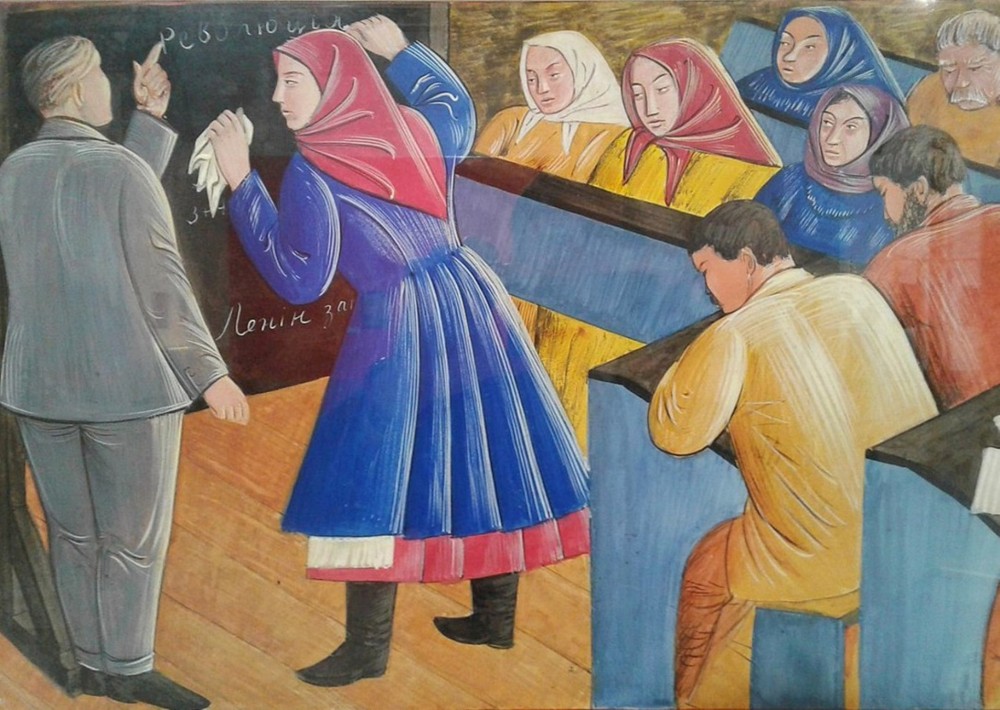
This article examines the philosophical aspects of the social and political components of the campaign to eliminate adult illiteracy in the 20s-30s of the 20th century. The philosophy of actions of the Bolshevik Party to overcome mass illiteracy and increase the educational level of the population included a large-scale cultural and educational campaign in 1919-1921, which in history was called “elimination of illiteracy”. With the signing of the decree of the Council of People’s Commissars dated December 26, 1919 “On the elimination of illiteracy among the population of the RSFSR”, and later the order of the Council of People’s Commissariat of the USSR dated May 21, 1921 “On the fight against illiteracy”, the organization of literacy training for the adult population became one of the most important directions in the work of the Soviet authorities. Education became compulsory for all citizens aged 8 to 50. The largest number of illiterates was in the national outskirts. In particular, the elimination of illiteracy in Ukrainian lands was organized by the Main Political and Educational Committee of the republic under the People’s Commissariat of Education, where the All-Ukrainian Emergency Commission for Combating Illiteracy was created. Therefore, according to the authors of the article, the philosophical aspect of the campaign to eliminate illiteracy was, first of all, of a social nature, since the illiteracy of the main mass of the population was considered by the intelligentsia as the most important problem, the solution of which was a necessary condition for the progressive development of a socialist society. The development of the economy and industry, as well as the change in the forms and methods of management, led to an increase in the need for qualified workers, specialists and literate people in general. Such workers produce more and work faster, easily accept new ideas and innovations, and demonstrate greater efficiency and responsibility. It was in the 1920s and 1930s that the Soviet campaign to eliminate illiteracy had its own characteristics. It was not only large-scale and rapid, but it was also culturally, socially and ideologically connected to the general changes taking place in society at that time. The philosophy of combating illiteracy and low literacy was a component of the state’s social policy and was aimed at raising the cultural level of the population, and became one of the priority areas of activity of the party and the Soviet government. In the course of the campaign to eliminate illiteracy in the 1920s and 1930s, we identified several key features of the process: 1) the main goal of the campaign was to create a new type of society with the dominant position of the party bureaucracy, which led to a high level of politicization. 2) the use of forced tempos and rigid methods is caused by the style of implementation of mass projects, which involved the active participation of public organizations, militarization, the class nature of administrative tools and mass. 3) as a result of overcoming illiteracy, the first step was taken towards achieving a real level of world culture for the main mass of the population. At the end of the 1920s, the need to solve the problem of mass illiteracy of the population of the Soviet state was realized by all party, social and public organizations. From this moment, the illiteracy of the majority of the population begins to be considered not only as a social, but also as a political, class problem. The problem of eliminating illiteracy became especially acute in connection with the beginning of forced industrialization of the country and forced collectivization of agriculture. The country desperately needed skilled workers for industry and agriculture. And for this it was necessary to give at least a minimum of knowledge to the workers. Thus, the fight against illiteracy gradually became a component of the cultural revolution and began to acquire a more political character. Mastering literacy has become a tool for mastering political literacy. The brainwashing of peasants and workers and, above all, of the intelligentsia took on more and more expressive forms and scales. This was manifested in the fact that enthusiastic public figures had to pass a test of political loyalty in order to spread various schools and circles of political literacy. The transformation of the fight against illiteracy into a component of the cultural revolution was supposed to lead to full state control over the process of eliminating illiteracy. So, we believe that in the period from the 20s and 30s of the 20th century, the elimination of illiteracy among adult workers and peasants was declared the most important condition for their involvement in the construction of socialism. And thanks to this, the campaign became a kind of foundation for the further development of public education and the basis of cultural and economic progress of the builders of the socialist society. However, against the background of the general context of Bolshevik policy, this campaign was one of the parts of the revolutionary transformations of the Soviet government, which was reflected in the methods and forms of its implementation and in the main results. Eliminating illiteracy was an important priority an important task of the Soviet authorities, and not only a social issue.
Source: Hrytsenko A.P., Kurok O.I., Prokopchuk V.S. (2023). Elimination of illiteracy in the 20-30s of the 20th century as a social and political project of the Soviet Government: philosophical aspect. Sumy historical and archival journal. №XL: 12-18
Source web-site: https://shaj.sumdu.edu.ua/wp-content/uploads/2023/06/3_Hrytsenko.pdf
Number of views: 2161